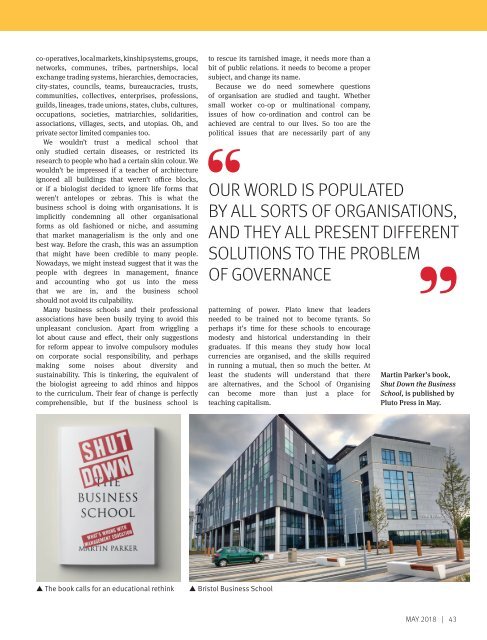MAY 2018
The May 2018 edition of Co-op News: connecting, challenging and championing the global co-operative movement. This issue shines a spotlight on governance – and how co-operatives do it differently. We also look at co-ops on the agenda in Westminster, sustainability supporting and preview some of the motions being put to the vote at the Co-op Group AGM.
The May 2018 edition of Co-op News: connecting, challenging and championing the global co-operative movement. This issue shines a spotlight on governance – and how co-operatives do it differently. We also look at co-ops on the agenda in Westminster, sustainability supporting and preview some of the motions being put to the vote at the Co-op Group AGM.
Create successful ePaper yourself
Turn your PDF publications into a flip-book with our unique Google optimized e-Paper software.
co-operatives, local markets, kinship systems, groups,<br />
networks, communes, tribes, partnerships, local<br />
exchange trading systems, hierarchies, democracies,<br />
city-states, councils, teams, bureaucracies, trusts,<br />
communities, collectives, enterprises, professions,<br />
guilds, lineages, trade unions, states, clubs, cultures,<br />
occupations, societies, matriarchies, solidarities,<br />
associations, villages, sects, and utopias. Oh, and<br />
private sector limited companies too.<br />
We wouldn’t trust a medical school that<br />
only studied certain diseases, or restricted its<br />
research to people who had a certain skin colour. We<br />
wouldn’t be impressed if a teacher of architecture<br />
ignored all buildings that weren’t office blocks,<br />
or if a biologist decided to ignore life forms that<br />
weren’t antelopes or zebras. This is what the<br />
business school is doing with organisations. It is<br />
implicitly condemning all other organisational<br />
forms as old fashioned or niche, and assuming<br />
that market managerialism is the only and one<br />
best way. Before the crash, this was an assumption<br />
that might have been credible to many people.<br />
Nowadays, we might instead suggest that it was the<br />
people with degrees in management, finance<br />
and accounting who got us into the mess<br />
that we are in, and the business school<br />
should not avoid its culpability.<br />
Many business schools and their professional<br />
associations have been busily trying to avoid this<br />
unpleasant conclusion. Apart from wriggling a<br />
lot about cause and effect, their only suggestions<br />
for reform appear to involve compulsory modules<br />
on corporate social responsibility, and perhaps<br />
making some noises about diversity and<br />
sustainability. This is tinkering, the equivalent of<br />
the biologist agreeing to add rhinos and hippos<br />
to the curriculum. Their fear of change is perfectly<br />
comprehensible, but if the business school is<br />
to rescue its tarnished image, it needs more than a<br />
bit of public relations. it needs to become a proper<br />
subject, and change its name.<br />
Because we do need somewhere questions<br />
of organisation are studied and taught. Whether<br />
small worker co-op or multinational company,<br />
issues of how co-ordination and control can be<br />
achieved are central to our lives. So too are the<br />
political issues that are necessarily part of any<br />
OUR WORLD IS POPULATED<br />
BY ALL SORTS OF ORGANISATIONS,<br />
AND THEY ALL PRESENT DIFFERENT<br />
SOLUTIONS TO THE PROBLEM<br />
OF GOVERNANCE<br />
patterning of power. Plato knew that leaders<br />
needed to be trained not to become tyrants. So<br />
perhaps it’s time for these schools to encourage<br />
modesty and historical understanding in their<br />
graduates. If this means they study how local<br />
currencies are organised, and the skills required<br />
in running a mutual, then so much the better. At<br />
least the students will understand that there<br />
are alternatives, and the School of Organising<br />
can become more than just a place for<br />
teaching capitalism.<br />
Martin Parker’s book,<br />
Shut Down the Business<br />
School, is published by<br />
Pluto Press in May.<br />
p The book calls for an educational rethink<br />
p Bristol Business School<br />
<strong>MAY</strong> <strong>2018</strong> | 43


















